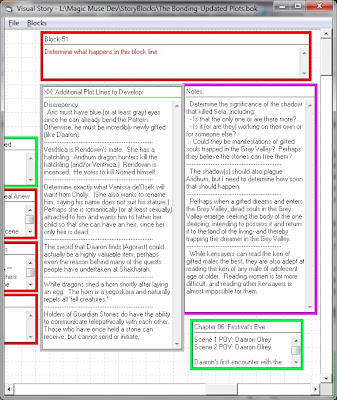
In my previous post (
How a Geek Writes an Epic Fantasy part 1) I introduced you to
Magic Muse, my writing workbench. But that's only a portion of my Epic Fantasy Writing tool set. I also wrote an additional program that I call
Visual Story. (One day I'll merge the two into a single application.) It has a number of uses, but I use it (loosely) as a storyboard or outline interface.
Essentially, the application consists of textboxes that can be sized and arranged on a large backdrop. Each box contains one section for a title or heading and a second section for content. Colors can be applied to each box's borders, titles and content. I prefer setting the border colors according to plots.

I tend to wrap a complete chapter into a single box. I list a description of the chapter's scene(s) and indicate which character's viewpoint is being used for each scene. This works well for documenting chapters already written. For planning, well, let's just say that this is about as close to true outlining as I get.
I've written a number of other applications over the years. One served as virtual index cards that I intended to use for character bios, description of places and things, etc., but I've found that my scribblet in
Magic Muse serves that purpose well enough for me.
But as much as I love my electronic tools, I don't rely exclusively on them.
Whiteboard

I have a whiteboard
beside my desk at all times. I've been known to draw on the
whiteboard. I sketched out the Hosiyin Citadel from my first book on
it. There were characteristics I knew I wanted, but I needed my eyes to
see it so I could see it through a character's eyes.
I
use the fine-tipped dry-erase markers so I can scribble loads of
legible text. I'll occasionally jot down the names of characters that
need addressing in the story and how soon. I'll work out plot mechanics
for finding logical reasons for Character A to be in Location B so that
Event C transpires according to plan. I may write about dragons and
magic, but even they must adhere to some form of logic.
Journal

When it comes down to fleshing out my world's settings, background, history and other such trivia that makes it into the manuscript only by--at best--a passing reference. Journals and diaries are great places for me to discover my world's history, back story.
I used this method for working out details of the last major war in my book, exploring treaty details, discovering the origins of races, even for writing short stories that serve no purpose other than enabling me to flesh out characters before they make it into the book.
The actual manuscript
I
sometimes type quick notes, reminders, potential dialog or possible narrative snippets right inside the manuscript itself, usually at the end of the scene or chapter. I do this when the snippet must be addressed or incorporated before moving too far into the next scene or chapter.
I've tinkered with
index cards, college or narrow ruled spiral-bound notebooks, even loose leaf paper, but I really prefer a searchable, organized electronic means
to store notes. And of course, I now have my Android tablet. It's great for proofing what I've written. The format and display is just different enough that I'll spot mistakes that I've overlooked a hundred times on the computer monitor.
What tools do you use?




















